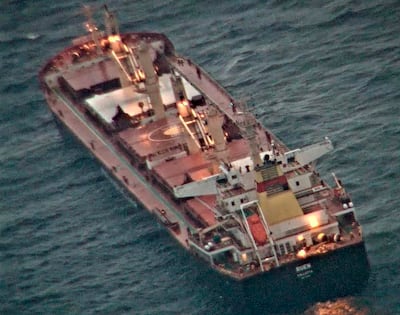Somalia's Al Shabab militant group fired a mortar at the presidential palace in Mogadishu on Wednesday, showing its continued threat on land as it seeks to profit from a resurgence in piracy off the country's coast.
One woman was killed when the mortar shell went astray and hit a shanty home a few blocks away.
The attack shows that the militant group affiliated to Al Qaeda is far from defeated, despite Somalia's internationally backed government inflicting a string of recent defeats on it.
In central Somalia, government forces this week captured the key Al Shabab stronghold of Ceel Bur, which the militants had controlled for the past 15 years.
Other smaller towns in the area have also been cleared of militants, who moved north into the mountainous Sanaag region, near the country's north-eastern coastline and close to where the Maltese-flagged MV Ruen is being held by Somali pirates.
Other Al Shabab members reportedly fled to pockets of southern Somalia still controlled by the group.
On Thursday, in a joint co-ordinated attack in the south of the country, Somali and US forces killed a senior Al Shabab commander who had a $10 million bounty on his head.
Maalim Ayman was accused of masterminding an attack on a US military base in neighbouring Kenya in which three American soldiers were killed.
Alliance with pirates
Despite these setbacks, Al Shabab has expanded its ability to disrupt the international order through a new alliance with Somali pirates operating off the coast.
Somalia has the longest coastline in Africa, extending for more than 3,000 kilometres, and is strategically located on the Horn of Africa, close to major shipping routes.
Al Shabab militants in Sanaag have reportedly reached a deal with the pirates to provide protection in exchange for a cut from ransom received.
The group is yet to officially confirm the agreement, but will reportedly receive 30 per cent of all ransom proceeds, which could provide vital funds after the government clamped down on its other illegal sources of funding and froze related bank accounts.
The deal has coincided with an increase in piracy in Somali waters, following a six-year lull.
Earlier this month pirates captured the MV Ruen, along with its 18 crew members.

Somali forces and a multinational antipiracy maritime mission in 2018 had clamped down on piracy off Somalia following 10 years in which pirates operated freely and hijacked ships.
The crew of the MV Ruen is still being held as the pirates reportedly negotiate a ransom with the owners.
“MV Ruen is currently in Xaabo near Qandala. Pirates and the ship owners are still discussing ransom,” Ahmed Mohamed, a close ally of the pirates, told The National by telephone.
“No figure has been confirmed yet but pirates are demanding that as part of the deal they promise not to harm the crew on condition that once they receive their ransom they be allowed to walk Scot-free and should not be attacked or arrested.”
He said the pirates are on the prowl for more ships to hijack.
“The second dhow that was recently hijacked near Eyl is currently being used by the pirates to hunt for other ships,” he added.
Red Sea shipping diverted
The threat from Somali pirates comes as Yemen's Houthis continue their campaign to disrupt international shipping in the nearby Red Sea and Bab Al Mandeb.
The Iran-backed group, which controls Yemen's capital Sanaa and major ports on the Red Sea, has launched drone and missile attacks against shipping in an attempt to pressure the international community to bring Israel's war in Gaza to an end.
The attacks by the Houthis, who are allied with Hamas against Israel, caused the US to send additional warships to the region and establish a joint maritime task force.
Despite the presence of US warships, major shipping companies have redirected their cargo away from the Red Sea, which connects Europe and the Indian Ocean via the Suez Canal and Bab Al Mandeb.
Commercial vessels have been forced to take the longer route around South Africa, pushing up the cost of shipping and fuel worldwide.

